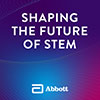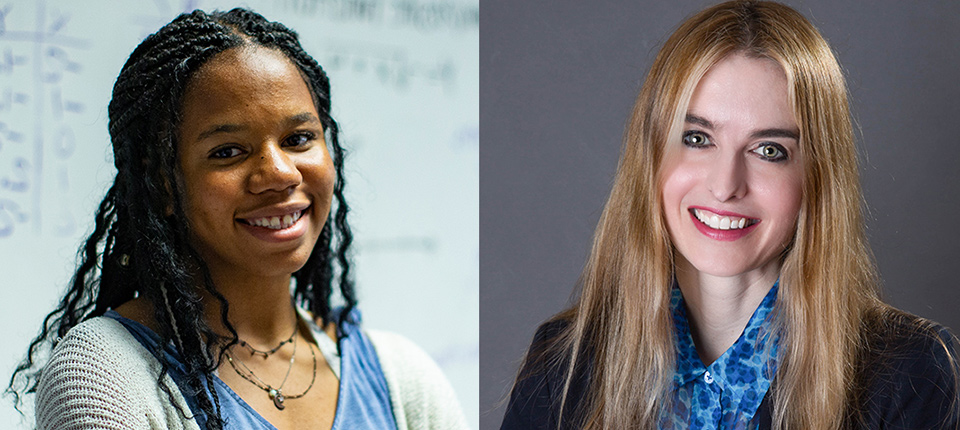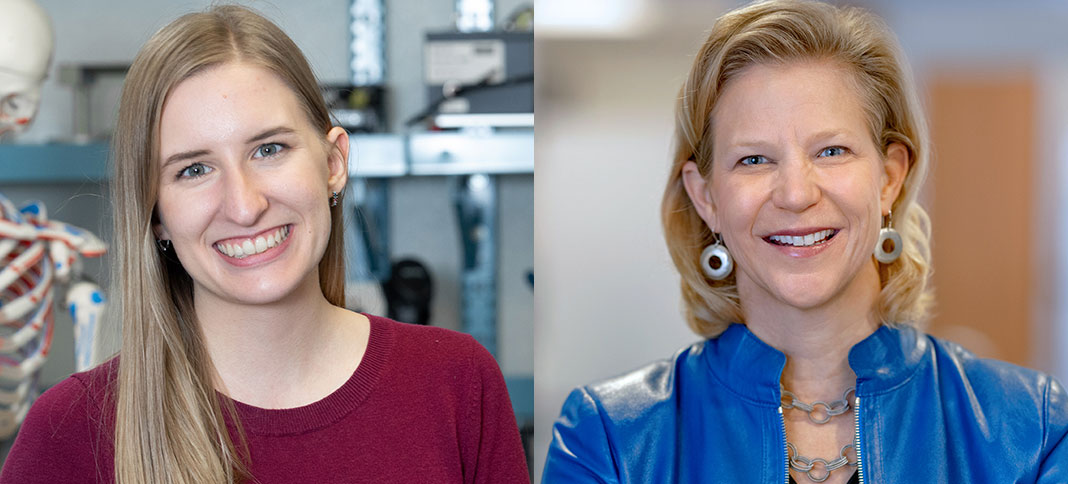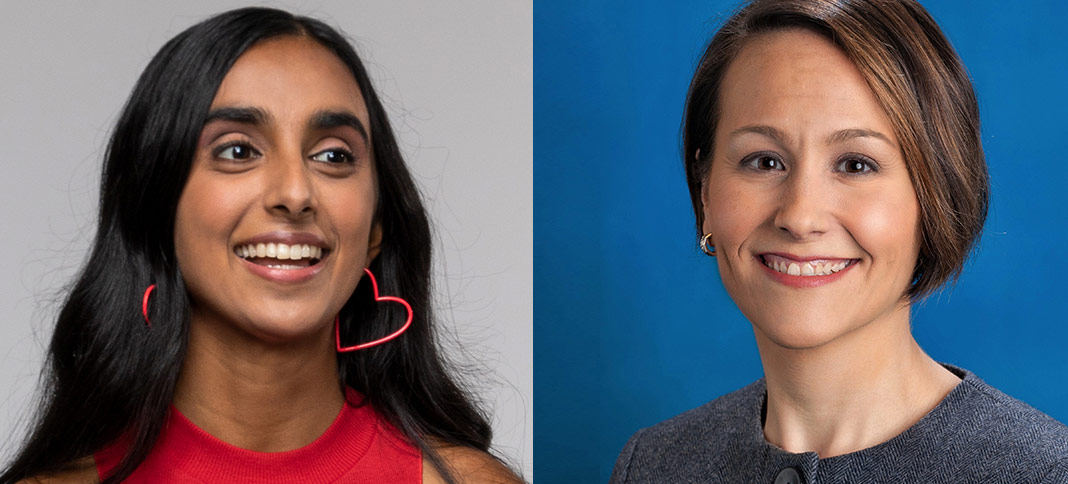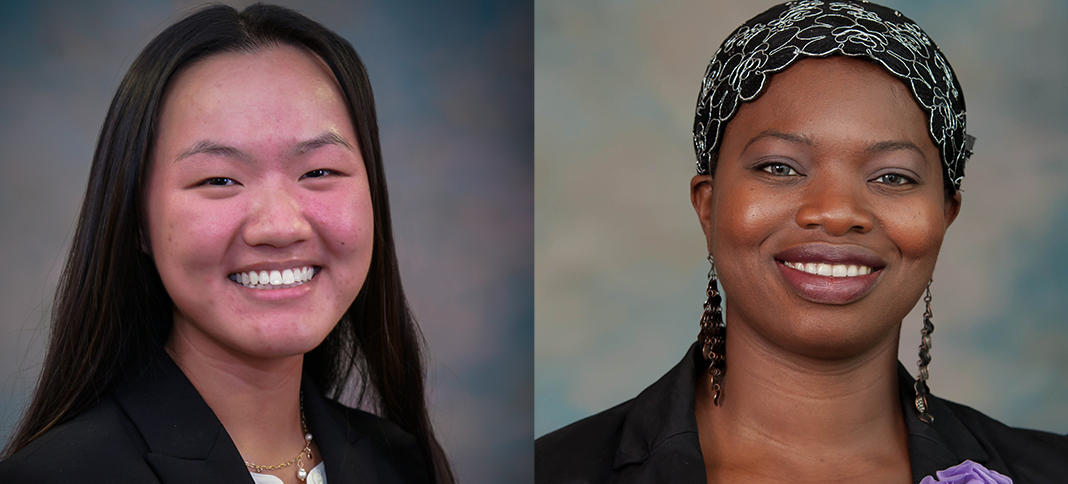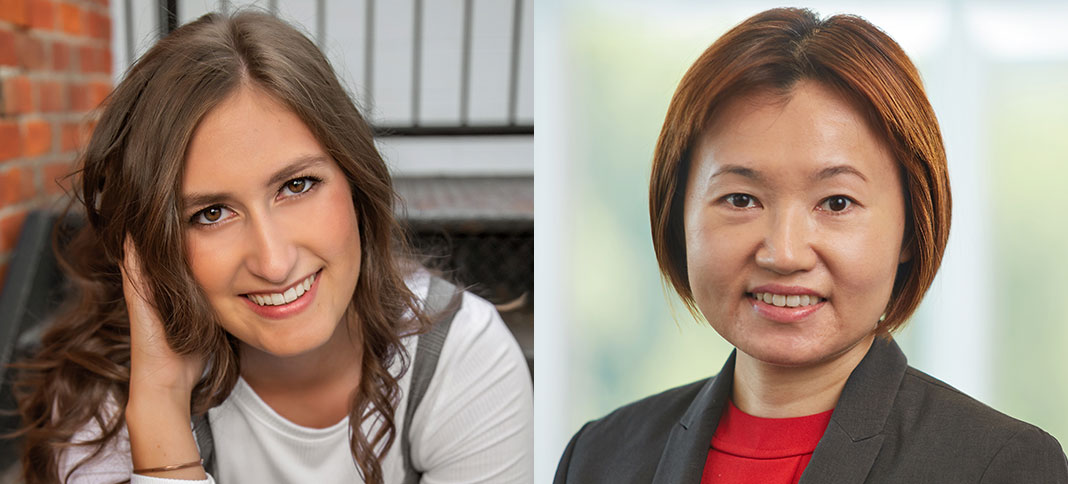
Podcast: How to Turn STEM Passion Into a Profession
Yen Ling Low, a Nutrition R& ,D expert at Abbott, tells intern Allison Huckins that women have limitless capacity to pursue STEM careers.
Nov. 18, 2021
- Copy Link
- Share on X
- Share on Facebook
- Share on Linkedin
In this edition of Shaping the Future of STEM, incoming college intern Allison Huckins, who is majoring in chemical engineering at Michigan State University, interviews Yen Ling Low, divisional vice president of Scientific and Medical Affairs for Abbott Nutrition Research and Development. Listen as Yen Ling and Allison discuss pursuing your passion for STEM in the professional world.
Allison, who also was an Abbott high school STEM intern, is the latest host on Shaping the Future of STEM. Every podcast episode features different female Abbott high school and college interns as they interview female Abbott STEM professionals from across the company. As a global health technology company committed to providing opportunities for students in science, technology, engineering and math, we offer opportunities around the world including our award-winning high school and college internship programs.
READ THE TRANSCRIPT:
Allison: Hello, everyone. My name is Allison Huckins. I'm an Abbott STEM intern, and the host of this episode's podcast. I'm happy to have with us today Yen Ling Low, who among her many accomplishments, holds a Ph.D. in Nutrition Sciences and has been with Abbott for more than a decade. Thanks for being here with us today Yen Ling.
Yen Ling: Well, thank you my pleasure.
Allison: Can we start with you sharing a bit about what you do for Abbott now?
Yen Ling: I'm the divisional vice president of Scientific and Medical Affairs for Abbott Nutrition Research and Development. So in my current role I lead a multidisciplinary team of more than 150 scientists, doctors, researchers and specialists globally to discover and develop science-based nutrition products to help people live healthier. Now, in addition to developing these products, my team is also actively engaging in nutrition education among consumers and healthcare professionals to raise awareness of the importance of nutrition in growth and development, health and recovery.
Allison: Could you tell me about how you first became interested in science and decided you would study nutrition in school?
Yen Ling: Well, honestly, I have always been interested in science since young and probably even before I know what is science, right. So I just find everything around me fascinating, right. I think science is fascinating because it helps me to make sense of the world around me and understand how things work. I think so many things can be explained by science. Example, you know, the four seasons, how the temperature changes, and how a light bulb works, and how an airplane, which is so heavy carrying, so many people can fly in the air. And you know, even simple things like why a puddle of water will disappear by itself with time because of evaporation, right. So I think science tries to explain so many things around us. And it just makes everything logical and explainable. So with time, then my interest in science gradually pivoted more and more towards an interest in health. Because I realized that health is really the key enabler and the foundation to enable people to live a healthy and full life, and to be able to do what you want in life. And as I think about health, and what is really critical for health, that's what led me to nutrition. Because when you look at a child, for example, right, how does a baby grow up to become a child, to become an adult? What are the things that have to go in? What are the inputs? And it's really nutrition, right. It's true that things you eat, that these becomes the building blocks for yourself, for your body. And therefore nutrition basically forms those key building blocks to health. And that's what led me to get interested in nutrition as the key to unlocking health.
Allison: What do you know about nutrition now that you wish you knew when you were in college?
Yen Ling: Well, what do I know about nutrition now that I wish I knew when I was in college, that's a great question. And I guess when I look back, I, there were a lot of things that I wish I knew when I was younger. When it comes to nutrition, I think I wish I knew how important nutrition is during childhood, right, when I was younger. Because honestly, when I was a kid and when I was in school, I was a rather picky eater, right. I choose food just based on taste, right. I like the taste, I eat it. I don't like the taste, I don't eat it. But as I learned more and more about nutrition, I realized that nutrition during childhood and adolescence plays such an important role in long term health. Because it's during those critical time window that you are really building your health bank. And by that I mean, for example, things like your peak bone mass, right. So you build the maximum amount of bone that you can build during those times, during adolescence, during childhood. And then once you get into a certain age after adulthood, you start to lose them. So the more you build when you're young, the better off you would be as you get older. So, I wish I knew the importance of nutrition. If that's the case, I will eat a much more nutritious diet and be able to build much better peak bone mass, peak muscle mass, that will put me in a much stronger position to enjoy a healthier life when I'm older.
Allison: I know when I was a kid, my diet basically consisted of mac and cheese. And I know now that that's not the best pathway to go in terms of what to be eating and nutrition is like, like you said, a huge building block for a lot of the rest of your lives.
Yen Ling: I wish I drank more milk when I was young.
Allison: Exactly.
Yen Ling: The importance of calcium, for example, in building strong bones, and then really when you're young, you're building right. So you are building your health, you're building your maximal bone mass, muscle mass, that's supposed to last you a lifetime. And as we get older after adulthood, it's really about preventing the loss and kind of like preserving that. So that's, I wish I knew how important nutrition was when I was younger.
Allison: So we know you're a scientist for Abbott, a corporation, but you've also done academic research and been with government agencies. What have you learned from these different career routes?
Yen Ling: So I started my career working with government agencies, and then later on moved to academic research and finally ending up here in Abbott. So, and I've learned so many different things through these different experiences. So I started my career working at the Singapore Ministry of Health doing public health nutrition. And working in the government, you really learn to look at issues in a much more macro and holistic way, right. So, for example, if you are looking at implementing, for example, a public health campaign to get people to eat healthier, right, eat more fruits and vegetables. You don't just have to look at telling people that they need to eat more fruit and vegetables, but you also have to look at the whole ecosystem, right. So are these healthier options accessible? Are they affordable? How do you make healthier options, also easier options for them? So you learn a lot about looking at all the related aspects of implementing a policy. And on top of that, you learn about the importance of simplifying a science message so that the layperson can understand, right. So why do I have to eat more fruit and vegetables? What makes it so healthy? Why is it so important? And there's so many complicated sides that you can tell people. But in the end, you have to be able to simplify it right down to a level that they can understand and appreciate for your message to cut through. So I learned all that when I was working in the government agency. And then after that, I went to do my Ph.D. and when I came back, I was doing academic research. And in academic research, I learned to dive very deep into a topic, right. So that's different from working with the government agency where you were looking at things in a very broad way. But here in academic research, I learned to dive very deep into a particular topic to get to the bottom of an issue and find an answer, right. So you often have to peel the question many layers in order to find the answer. So I learned to break down a big question into multiple small questions and answer then systematically in order to get the answer to the big question. And I think that kind of analytical thinking skills have proven to be very useful in problem solving. And then finally, when I was in, when I came to Abbott, I was able to combine and apply all the knowledge and skills I gained to develop science-based products that would appeal to consumers. So I was able to combine the knowledge of, how do you do R&D, to dive into a question very deeply to get the solution. And then when developing the solution, how do you look at it in a very broad way to make sure that your solution takes care of all kinds of aspects? And then also, how do you simplify the science messages and science benefits in a way that will be understandable to the lay public? So I think having gone through all these different experiences, it has been really useful to integrate all these learnings as I look back in my career journey. So I think the bottom line is that I think all these different experiences have taught me very different and complementary skills. So for the young people out there, I really encourage you to always embrace opportunities to gain different experiences because that is the best way you can learn and grow.
Allison: So, you've lived in Singapore, the United Kingdom and the United States. And you have worked on projects in various countries, including Vietnam, China, India and the Philippines. What are the benefits and challenges you’ve experienced having an international career?
Yen Ling: In terms of benefits and challenges, I've experienced through such international career, I have to say that these international experiences have been absolutely wonderful. Because you learn so many things that you wouldn't learn in textbooks. And you learn so many things just through living in different countries and experiencing different cultures. The benefits of such experience are really tremendous. It opens up your mind and your horizons and you realize that the world is so big with such rich diversity. And there are many ways to get something done. And a method that works in one place may not work in another place. I think it teaches me to be much more flexible and creative when thinking about issues or thinking about solutions to problems. And I also learned to appreciate the value of diversity much more, learn the virtues in each culture and be able to harness such diversity into strengths. So I think this international experience brings tremendous benefits. Now in terms of challenges, and of course, it's not easy, you know, going from one place to another and having to learn a different culture, and sometimes different language as well. And the challenges of this international experience are that the learning process can sometimes be uncomfortable, or even frustrating, because it involves stepping out of my comfort zone, right. So I ended up encountering situations that might, I may never have encountered before. And then faced, encountering problems that may not make sense at all, right, because it's just not something that you could comprehend, like how these things happen like that? But once you get through all that, you look back and appreciate how useful these experiences have been in shaping you to be who you are. So I think this experience is truly wonderful and I really recommend it to everyone.
Allison: I feel like it is definitely a really important thing in order to understand the world, like being able to actually go out and experience the world is really the only way that you can really fully understand a culture in the way like other parts of the world work.
Yen Ling: Yeah, that's right. And really nothing beats real experience. You can read about a place and you can read about culture, but until you're in there, you never get to experience the real thing. And I think those experiences are so invaluable, and they really teach you so many things beyond what you could ever read or see in the website.
Allison: Studies show that there are fewer women in STEM, and those within STEM will drop out after a period of time. Why do you think that is, and what do you think we can do to change that?
Yen Ling: So I think having more role models will definitely help. And the other thing that I think may be contributing to less women in STEM or less women staying long in STEM is that the success in STEM careers often requires someone to keep working in STEM arena over an extended period of time. But women tend to have more what are called interruptions in their career, right. For example, that women may think that, 'Oh, I'm getting married, I'm starting a family. So I'm going to have to take a break. So I don't think I can persevere in this for too long. So I shouldn't even start.' right. So, and women also do take a disproportionate share of the responsibility of childcare, or parenting, caregiving, or even doing housework. And these can sometimes cause interruptions in the career, but it does not have to be so. I find women can be very harsh on ourselves in terms of having high expectations of ourselves and, and also having lower confidence level. And we don't think that we can have it all. I encounter so many women who say that 'Well, you know, I have two kids. I don't think I can do this right. I don't think I can devote enough time.' But yet you also see women who are able to manage everything well and really have a good family life and as well as very successful scientific careers. So I think all this can be done. And the key to encouraging more women to get into STEM and also prevent more women from dropping out, is really to create more role models and communicate those and create better support networks, such as mentorship, coaching and organize more outreach activities right such as, such as this one, to help send the message out that women, that there are many women that are very successful in STEM. And there’s really no reason why women cannot have a very successful STEM career and still have very good family life.
Allison: I know that a lot of the reason why I got into STEM was because I had a lot of women who I grew up with who were in STEM. And getting into this high school program really kind of solidified those ideas, because I did get to see so many women who are pursuing their careers. And even I met some people who did have those life interruptions, but they’re still going in their STEM careers. So it can be done. And I think that is something that it just needs to be shown out to the world more.
Yen Ling: Exactly. So I think women just need more encouragement and need some more positive reinforcement that it can be done.
Allison: What advice would you give to girls thinking about pursuing degrees in STEM?
Yen Ling: It is super important to pursue your passion. If you're interested in STEM, go for it, there is no reason to hold back. Because there's absolutely no reason that girls will be less successful in STEM. And we see many examples of women with highly successful careers in STEM. I think it's so important to follow your heart and pursue your passion. And when you do something that you're really passionate about, you will naturally do well.
Allison: I think you can learn a lot from other women’s stories. What women do you admire and inspire you in your life and in history, and why?
Yen Ling: I think we can indeed learn a lot from other women story. And in fact, we, we don't have to look hard into the history to look for famous characters to inspire us. In fact, I find that I get inspired more often just through the interactions with ordinary women around me in my life. And many of them have extraordinary stories. If you just take the time to observe and to listen to different women and find out about their stories, you will realize so many of them have stories that are inspiring. I've encountered so many women in my life. And some of them too, for example, people that I've worked with. And you meet women who are, they're dealing with so many challenges in their life, for example, right. They could have been having challenges in their, in their work, and also in their family. And you know, they have children or parents that need caregiving. And then they have very challenging projects that they have to do at work. But yet they still do not hesitate to reach out and help someone else whenever they meet someone that needs help. So I think women have such limitless capacity to give and to love and to share, that, you know, I just always feel so inspired by just ordinary women that we meet day-to-day.
Allison: I think it's so important to not think of STEM as so unreachable, that your inspirations are people from history that made it big, but really, you can find those women like around you, you could find them at a grocery store. You can find them in your neighborhood. And I think it's so important for girls to understand that you don't have to be crazy special in anything to be able to pursue STEM. Like you can just be yourself and let yourself be inspired by those ordinary people who can be so inspiring with their stories, because they are the people who really make the world the way it is.
Yen Ling: Exactly. I totally agree with you. So I think, you know, STEM is not something that is so abstract. And so, so far away that it's takes a big step to understand. You know, I think science is in everyday life, you know. So you encounter many women that, you know, I think everybody is a scientist in their heart, you know. So in terms of science, it's just everyday activities and phenomenon that's happening around you. And then the you know, every day you are encountering some kind of problems that you’re trying to make sense of, that you're trying to understand, and then you're trying to troubleshoot, and all this is a form of scientific analytical thinking that you're practicing, whether or not you realize it. So I think science is so much integrated in everyday life and entering STEM is actually a very natural thing.
Allison: Well, thank you again for your time Yen Ling. I'm going to end with a question we ask everyone on our podcast. Would you rather build sandcastles or snow forts?
Yen Ling: Would I rather build sandcastles or snow fort? Well, I think that's a really interesting question. I was born in Singapore. I grew up in Singapore, which is a tropical country with no snow. So I've never built a snow fort before. I have built sand castles before. So would that rather build a sandcastle or snow fort? My answer definitely will be snow fort. Why? Because I think life is about stepping out of the comfort zone and trying something new that you've never done before, so that you can stretch yourself and learn and grow and emerge as a stronger and better person. So even though I have never built a snow fort before, I would go for snow fort even though the snow fort I build may not be great, it may not be successful, I will still go for it. Because you know, that's how we will learn and grow. It's all about stepping out of comfort zone and having adventure there and enjoy your life.
Allison: I'd have to go as snow forts too. Growing up in Ohio, we get a lot of snow in the winter. So that's kind of what I've grown up with. But we do also have some really nice beaches around. But I still prefer the snow over sand. Thanks again for your time today.
Yen Ling: Thank you.
For more stories and advice from Abbott's female STEM interns and experts, check out our Shaping the Future of STEM episodes wherever you get your podcasts.
Related articles
-
Strategy and Strength
Podcast: How to Find STEM Success? Learn to Pivot.
Neuroscientist Beth McQuiston talks with intern Jomi Babatunde-Omoya about how flexibility builds career success.
-
Strategy and Strength
Podcast: How Confidence Can Open Doors in STEM
Lisa Earnhardt – the head of Abbott's Medical Devices division – discusses finding your authentic self with intern Stephanie Slowik.
-
Strategy and Strength
Podcast: How to Find Support When You're Studying STEM
Abbott intern Diya Iyer talks with Betsy Wille about how to find support when you're studying STEM subjects.
-
Strategy and Strength
Podcast: How to Turn STEM Curiosity Into a Career
Microbiologist Zaina Bawa-Mamudu talks with an Abbott intern about mentoring, diversity and curiosity.
For the latest on Abbott’s life-changing technology, get updates directly in your inbox.
